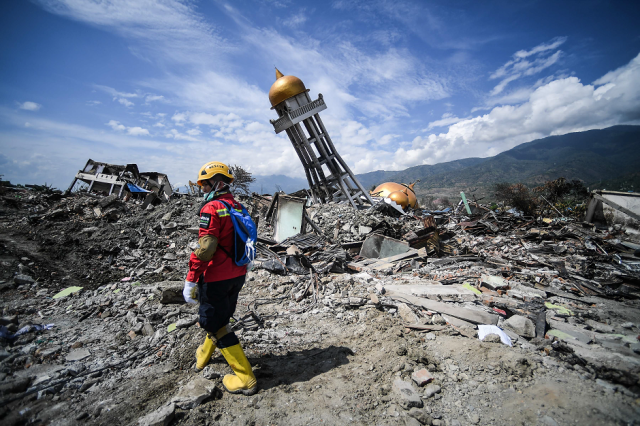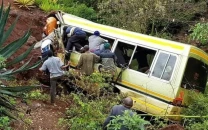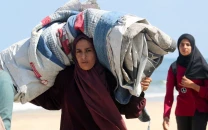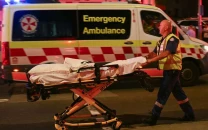Christians give thanks, mourn amid debris of Indonesian quake
The official death toll stands at 1,649 but will rise as bodies are recovered from the ruins of buildings

PHOTO: AFP
devastating earthquake.
Indonesia has the world's biggest Muslim population but there are Christian communities throughout the archipelago, including in the small city of Palu hit hard by a 7.5 magnitude earthquake and tsunami on September 28.
The official death toll stands at 1,649 but will rise as bodies are recovered from the ruins of buildings and from morasses of debris and mud in the city's southern neighbourhoods hit by liquefaction, a phenomenon that turns the ground into a roiling quagmire.
"We are so relieved to be alive but sad because so many of our congregation died," said Dewi Febriani, a 26-year-old economics student, after a service in a tent set up outside her damaged church.
The Toraja Church in Jono Oge village, just south of Palu, had cracks through is walls and is considered unsafe. Its cross stood high. Pews were brought out and set up under the tent. Febriani said her house was destroyed in the disaster.
"One of the only things I have dared to save was my Bible," she said, holding the well-thumbed copy in her lap. Jono Oge was particularly hard hit by liquefaction.
Dozens of teenagers at a nearby church and Bible camp were killed. Many of their bodies lie buried in the mud. A woman attending a service outside a nearby church that was also badly damaged said the disaster was a 'reprimand' from God.
"We are witness to God's power. We're still scared but we pray because we believe God will help us," said the woman, Eliwati, who wore a bright blue dress with an ethnic Toraja pattern, a splash of colour in a bleak landscape. The congregation sang hymns just behind her as she spoke.
'WATER IS RISING'
Most of the dead have been found in Palu, the region's main urban centre. Figures for more remote areas, some just re-connected to the outside world by road, are trickling in. The area at the epicentre of the quake, on a coastal strip dotted with villages north of Palu, was cut off for nearly a week by landslides but the way is now open.
Casualties are not as heavy as feared because many residents were outside after a smaller quake struck three hours earlier, villagers said.
That stretch of coast was not hit by a big tsunami, although surging waves did carry away many fishing boats, they said. Fisherman Arman Halim said he was preparing to go out to sea after dinner, and was loading his boat with his nets, when the waves came.
"People started shouting 'the water is rising' and we had to abandon our boats to save our lives," he said in he village of Lambonga. He estimated 200 boats were lost in the area.
Sulawesi is one of Indonesia's five main islands and, like the others, is exposed to frequent earthquakes and tsunamis. In 2004, a quake off Sumatra island triggered a tsunami across the Indian Ocean that killed 226,000 people in 13 countries, including more than 120,000 in Indonesia.
A big aid operation is gearing up to help hard-hit communities where some 70,000 people have been displaced. Indonesia has often been reluctant to be seen as relying on outside help to cope with disasters.
The government shunned foreign aid this year when earthquakes struck the island of Lombok but it accepted help from abroad for Sulawesi. The government says it particularly needs aircraft, generators, tents, water treatment and field medical facilities.



















COMMENTS
Comments are moderated and generally will be posted if they are on-topic and not abusive.
For more information, please see our Comments FAQ